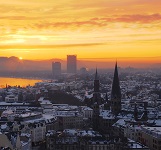 June saw two weeks of meeting in Bonn to pave the way for a final international agreement on climate change in Paris next year. Despite early disappointment at the small number of environment ministers attending – despite an undertaking given in Warsaw last year for ministers to attend – the communique issued on 15 June was upbeat.
June saw two weeks of meeting in Bonn to pave the way for a final international agreement on climate change in Paris next year. Despite early disappointment at the small number of environment ministers attending – despite an undertaking given in Warsaw last year for ministers to attend – the communique issued on 15 June was upbeat.
It stated: “The positivity around the past two week’s meetings culminated at the close when governments asked that the elements of a draft treaty be made available by July in advance of the next meetings in Bonn in October.”
Kishan Kumarsingh and Artur Runge-Metzger, the co-chairs of the working group tasked to construct the 2015 agreement, said in a joint statement: “The co-operative and positive atmosphere so self-evident here in Bonn has now translated into a significant step forward towards the elements of a draft treaty that needs to be a key outcome by the end of the year in Lima, Peru.
“We are determined to ensure we make these available in July towards a comprehensive new treaty in 2015 that will protect the planet and its people from dangerous climate change.”
In March the Ad Hoc Working Group on the Durban Platform for Enhanced Action (ADP), the body tasked to construct the new agreement and raise immediate ambition to address climate change, brought forward inspiring examples in the fields of renewable energy and energy efficiency.
During the June meeting, which closed today, the focus was on urbanization and land use as pathways to raise that pre-2020 ambition.
“An increasing number of governments spoke of the growing understanding that Paris 2015 needs to be a turning point where decisive and defining pathways are put in place towards not only a low carbon but ultimately carbon neutral world,” said Christiana Figueres, Executive Secretary of the UN Framework Convention on Climate Change (UNFCCC).
“That is where the science tells us we need to go as a global community if we are to manage the risks and seize the opportunities from addressing climate change.”
However, only a small percentage of cities have international credit ratings which can limit their ability to access capital markets and invest in accelerating low-carbon infrastructure. The World Bank is assisting cities through ‘Creditworthiness Academies’ and other support. The Ugandan city of Kampala, for example, expects to secure a full rating in 2015.
The Intergovernmental Panel on Climate Change (IPCC) estimates that land use, including deforestation, is responsible for just under a quarter of human-induced greenhouse gas emissions. During the June meeting members of the IPCC were present to explain directly to delegates the implications of their findings for policy going forward.
“The meetings here in Bonn this June may perhaps go down as a point in time where governments showed new and higher levels of cooperation and positivity towards a meaningful agreement in Paris and the goal of limiting a global temperature rise to under 20 Celsius,” said Ms Figueres.
“The highlighting of opportunities from the urban and land use areas – building on our March meeting spotlighting opportunities for accelerating energy efficiency and the penetration of renewables – is building confidence, raising pre-2020 ambition and triggering calls for greater policy and financial support to realise these transformations,” she added.
“The UNFCCC stands ready to play a catalytic role, matching the interest and demand from governments with those who can deliver the skills and the finance ranging from sister UN agencies and the Bretton Woods institutions to NGOs, business and private finance sector.”